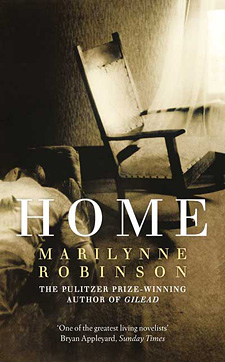 I love this book and I love this author. She is so idiosyncratic. For one thing, she wrote a popular, award-winning novel (Housekeeping in 1981) and then didn't write another piece of fiction for 20 years (Gilead in 2004). In the meantime, she wrote a couple of collections of essays defending John Calvin, Jonathan Edwards and their descendants pointing to their heritage of social justice and universal education. She also focused her energies lecturing at the famous Iowa's Writers' Workshop.
I love this book and I love this author. She is so idiosyncratic. For one thing, she wrote a popular, award-winning novel (Housekeeping in 1981) and then didn't write another piece of fiction for 20 years (Gilead in 2004). In the meantime, she wrote a couple of collections of essays defending John Calvin, Jonathan Edwards and their descendants pointing to their heritage of social justice and universal education. She also focused her energies lecturing at the famous Iowa's Writers' Workshop.
Another idiosyncrasy is that she chose to write her third novel, Home, using the same situation, time, context and events as the Pulitzer-Prize-winning Gilead, but from the perspective of another family living in the town. That could have been risky, because readers of the first novel know exactly what is going to happen… but it works.
It works because Robinson is a very gifted writer, with beautiful prose, characters you care about, and exceptional dialogue.
It also works because it is so interesting to see events and people and situations from another perspective.
Another reason why I love this author is because she is unapologetic about writing about people of faith, and theology. It is affirming to read about Christians who are not stereotypes, or pathetic, or too good to be true; and to hear discussions of theology, not in textbooks, or popular non-fiction, but in the midst of everyday conversation. All of this is done so intelligently and clearly (without dumbing down) that non-Christian readers have also bought and loved her books. In fact, they are marketed to a general audience.
Part of her appeal is the mix of grand themes: American politics and history, and particularly race relations; with the accurate depiction of the minutiae of everyday life. Robinson has said:
"I think that the real emotional content of lives tends to be negotiated in terms of small gestures, little courtesies toward one another, little provisions for one another's comfort… we see them as the fabric of our lives with others… and that's just lovely to me."
The background of the book is the parable of the Prodigal Son, which Robinson describes as a default narrative for her. The black sheep Jack has returned home to his dying father, who is being nursed by his youngest sister, Glory.
This narrative introduces concepts of grace and forgiveness and love and salvation and redemption… but there is a strong line of realism. These great gifts are not given or received easily. There is the difficulty of guilt and past hurts and social kindnesses that can mask the truth.
All of us can at some level relate to the painful conversations between father and son, and brother and sister, as they come to terms with what has happened and what is happening, and try and negotiate what the future might look like. The wounds caused by living closely with people you love, but who know your vulnerability, are so easily reopened.
However there is a connection between salvation and healing - the root word of save and salve are the same - and this is the hope that the book points to.
Home is a wonderful read that will challenge you about the home you might have left, the home you might be creating, and the home you hope to enter.

























